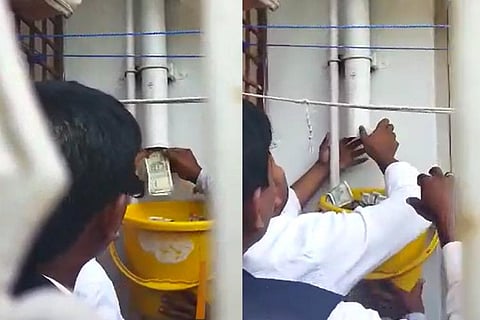

On Wednesday, November 24, the Karnataka Anti Corruption Bureau (ACB) pulled out wads of cash from the drainpipe of a house in Kalaburagi — the video of which has gone viral since then. The wads of cash retrieved from the pipe amounted to Rs 13 lakh. This was besides the other articles seized from the house — Rs 54 lakh in cash, property documents for 36 acres of agricultural land, two more houses, one plot of land in Bengaluru, three cars and other valuables including gold. All this money and properties were retrieved from the house of Shantana Gowda, a junior assistant engineer of the Public Works Department (PWD) in Karnataka. And it was unaccounted and disproportionate to his income, said the ABC officials.
This got many people thinking — how can a junior-level engineer make so much money? However, it came as no surprise to the anti-corruption activists and those working with government offices. In fact, they said it will also not be astonishing if officers of senior ranks also have huge disproportionate wealth. The same day, the ACB also seized crores in cash and valuables from 15 such low to mid-level government officials.
A Junior Engineer with PWD in Karnataka is the most essential official in the entire engineering division. Private contractors interact with the government department through the Junior Engineer for any basic infrastructure development work, be it for laying of a road or construction of a building. The JE remains the primary point of contact until the project is executed.
Speaking to TNM, a former senior government official explained, “For instance, if a road is going to be laid, a Junior Engineer will fill up the measurement books for the length and breadth of the road to be laid, how deep the concrete should be laid and how much materials should be used for the project. Even during the execution phase, he will be the first person to inspect and approve the quality of work, if the road is laid in compliance with the tendering conditions. Upon completion of the work, it is the junior engineer who can issue bills for the contractor to get paid for parcels of work done.”
“So, in all these phases, if the JE is willing to compromise on the specifics mentioned in the tender conditions for the contractor’s benefit, he will be compensated by the contractor,” he added.
ACB officials seize Rs 13 lakh cash from a drain pipe from the home of a junior engineer in the PWD Department in Kalaburagi #Karnataka. pic.twitter.com/uA7d4V27Fp
— Nitin B (@NitinBGoode) November 24, 2021
According to Anil Kumar GR, an anti-corruption activist in Bengaluru, “Junior Engineers can make a lot of money if they take part in the illegalities during the execution level.”
For example, if a road is to be made with a specific quantity of concrete for a specific depth, the JE, being at the spot, could collude with the contractor and build the road from a higher depth, he alleged.
“Once the road is freshly laid, there is hardly any way to figure out if there have been any irregularities. This is why we see roads getting worn out within six months of commissioning. If all parameters were followed, then the road should ideally last for much longer,” said Anil, adding that it is not just one officer or junior officers but many senior-level officers, too, are involved in such malpractices.
According to Ravikrishna Reddy, an anti-corruption activist and president of political party Karnataka Rashtra Samithi Party (KRS), such raids are a big eyewash to punish “small-time corruption of junior level officers.” He said that the rot of corruption is often institutionalised from top to bottom, with a clear link between politicians, officials and contractors.
“The ACB, in its four years of existence, has spent more than Rs 130 crore of public money on activities like raids but could convict only three persons so far. This is based on the RTI replies we received in February earlier. Since then, we have been highlighting the inadequacies of their functioning,” he said.
He added that ACB works under the Chief Minister’s office, and all raids are carried out keeping in mind the possible political fallouts, balming former Chief Minister Siddaramaiah for disbanding the independent Lokayukta. “We all know that there are multi-crore scams that involve IAS and IPS officers but the Karnataka government is not serious about tackling them until there is a court order. On rare occasions, we have seen Karnataka Administrative Service officers being raided, but not the higher-ups,” he added.